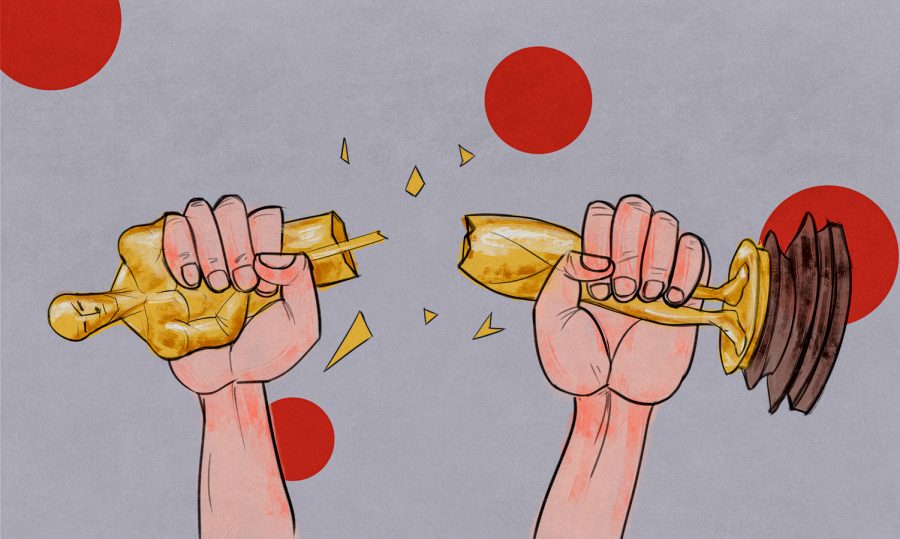OPINION: Awards shows need to change to stay relevant
Current events, mistakes, racism contribute to failing Academy
The Oscars have been shrouded in controversy for decades, but the rise of streaming platforms combined with their controversial history might finally push the show into total irrelevance.
April 12, 2022
As a movie lover, I always used to look forward to a dazzling night watching the Oscars. However, over the past several years it has become apparent that the Oscars are, simply put, going downhill.
Academy biases, predictable outcomes and yes, drama take away from the overall theme – the appreciation of film and artistry. Ultimately, the Oscars have become another way for society to argue over the events that occur.
During these last Oscars, things were taken to a new extreme that solidified the lack of hope there is for the future of Hollywood when actor Will Smith slapped comedian Chris Rock on stage over an unwarranted joke about Smith’s wife.
What is most concerning about the situation is that the Academy was simply unresponsive. Only minutes after the incident, Smith carried on, giving a speech and accepting an award on stage, for which he was given a standing ovation.
If this alone does not speak volumes about the values those in Hollywood hold close, I do not know what does.
It was not until two weeks after the incident that the Academy stated that Smith will be barred from attending the Oscars for the next10 years, according to the New York Times.
This is not the first time the Academy has responded too late to a situation. In 2017, the winner of the Best Picture award had just been announced, and the producers of “La La Land” were on stage making their acceptance speeches for several minutes.
Suddenly, producer Jordan Horowitz stopped them, waving a white card and saying, “There’s been a mistake. ‘Moonlight,’ you guys won Best Picture. This is not a joke.”
This moment was the beginning of the end for me. The fact that they gave the host, Warren Beatty, the wrong card for one of the biggest awards of the night without even double-checking is so unbelievably careless.
The mistake was disrespectful to the cast of “La La Land,” who literally thought they won the biggest award of the night, as well as the true winners, the cast and crew of “Moonlight,” who had their incredible moment overshadowed by the ridiculous mistake.
It is also notable that the primary victims of both of these events were Black people – “Moonlight” is about a gay Black man, and the original joke that resulted in the Will Smith/Chris Rock smack down was at the expense of Smith’s wife, Jada Pinkett Smith, and her experience with alopecia.
It might be a coincidence. Maybe. Regardless, it is critical to take these facts into account, especially considering the racist history of Hollywood.
In fact, the first Black person to ever win an Oscar in 1939, Hattie McDaniel, was not even allowed to attend the ceremony and accept her award because the ceremony was held at a segregated, all-white venue.
The pattern pervades today. Halle Berry remains the only Black woman to win Best Actress in the entire history of the awards.
Hopefully things will start to change as more people take notice and engage in campaigns like #OscarsSoWhite. However, the lack of diversity and poor handling of Academy controversies are not the only issues with award shows.
Sophomore psychology major Tori Mandel said she thinks that the Oscars are becoming less popular because younger generations prefer faster-paced events. Televised live events are also declining in popularity due to the rise of streaming services.
The societal changes accompanying the pandemic also contribute to the decline of awards shows.
Kaylee Sugimoto, journalism major at Illinois State University, said that she was devoted to watching the Oscars annually up until the pandemic hit. She even made a bracket each year to guess the award winners.
“I think COVID was the first year I didn’t watch it because I had no idea what movies were coming out,” Sugimoto said. “It was really weird with all the box-office and movie theater regulations.”
Since then, Sugimoto said she has not watched the Oscars and that, in general, it has become less prominent in the media.
I used to thoroughly enjoy the entire experience of the movies by going to the theater each weekend with my friends or family. As of today, I have not gone to a movie theater in several years.
At first, it was simply because I was not interested in sitting next to strangers in such close proximity during a pandemic. However, the pandemic seemed to entirely shift the way people watch movies.
With streaming services like Disney+ and HBOMax now releasing movies on their platforms, it is easier for people to watch their favorites from the comfort of their own homes. It seems the lack of cinematic experiences is contributing to the lack of interest in the awards shows that emphasize the artistry of cinema.
If awards shows want to remain relevant, the Academy needs to get with the times – that entails more accessibility to keep up with streaming culture, better overall quality control and more appreciation and respect for people of color in the film industry.










